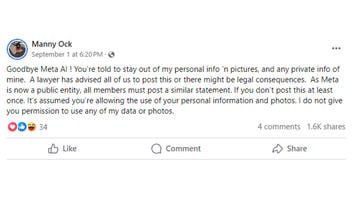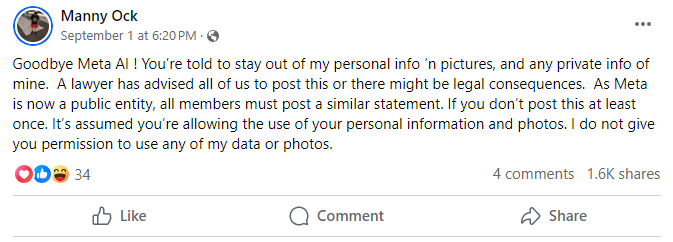
Does posting a statement ensure that users of Meta services will not have their data used in Meta's artificial intelligence training? No, that's not true: Posting the viral statement, or any other statement, doesn't mean that Meta will not use that data for AI training, but users in Europe can object via a form in their account settings. The statement is an example of "copypasta," text containing information that's often not true but which is repeatedly copied and pasted online.
The claim appeared in a post (archived here) on Facebook on September 1, 2024. The post read:
Goodbye Meta AI ! You're told to stay out of my personal info 'n pictures, and any private info of mine. A lawyer has advised all of us to post this or there might be legal consequences. As Meta is now a public entity, all members must post a similar statement. If you don't post this at least once. It's assumed you're allowing the use of your personal information and photos. I do not give you permission to use any of my data or photos.
This is what the post looked like on Facebook at the time of writing:

(Source: Facebook screenshot taken on Wed Sept 4 14:38:50 2024 UTC)
Meta's generative AI
Meta announced the launch of generative AI features in September 2023 (archived here). According to a Facebook privacy resource page (archived here), Meta's generative AI gathers its information from public sources, users' public posts and users' interactions with the AI features. Thus, Meta can use users' public posts and engagement with the company's AI features to strengthen those features' capabilities (archived here).
Opting out
In a press release (archived here) published on June 10, 2024, Meta informed European Facebook users that they can submit an objection form that "that gives people the opportunity to object to their data being used in [Meta's] AI modelling efforts." European users can find the objection form in their Facebook settings.
At the time of writing, it doesn't appear that there is a proven way for the content generated by Facebook users in the U.S. to be exempt from Meta's AI training. The New York Times (archived here) and MIT Technology Review (archived here) reported that U.S. users may lessen the opportunities for Meta's generative AI using their posts by making their accounts private. However, there is no statement from Meta that guarantees that U.S. users can even request that Meta's generative AI not use their data for training.
Lead Stories reached out to Meta for more comment on the claim. We will update this story with any relevant response.
The statement is 'copypasta'
"Copypasta" is a genre of internet content in which information, often untrue, is spread by repeated copying and pasting.
Lead Stories did a search using keywords on Google, visible here, (archived here) which found no credible documents or reporting to corroborate the claim. However, the search results did suggest that the statement is just an exact regurgitation of unverified information: In other words, it's classic copypasta. Lead Stories has previously debunked claims that feature such text: They can be found here.
(Editors' Note: Facebook is a client of Lead Stories, which is a third-party fact checker for the social media platform. On our About page, you will find the following information:
Since February 2019 we are actively part of Facebook's partnership with third party fact checkers. Under the terms of this partnership we get access to listings of content that has been flagged as potentially false by Facebook's systems or its users and we can decide independently if we want to fact check it or not. In addition to this we can enter our fact checks into a tool provided by Facebook and Facebook then uses our data to help slow down the spread of false information on its platform. Facebook pays us to perform this service for them but they have no say or influence over what we fact check or what our conclusions are, nor do they want to.)
















